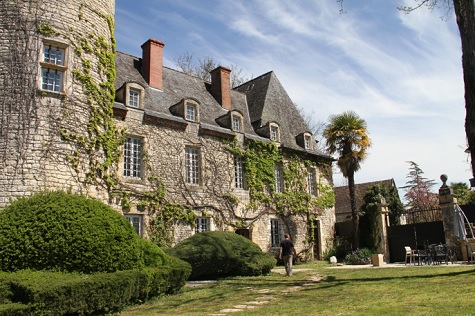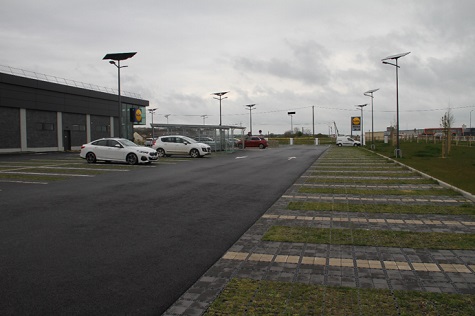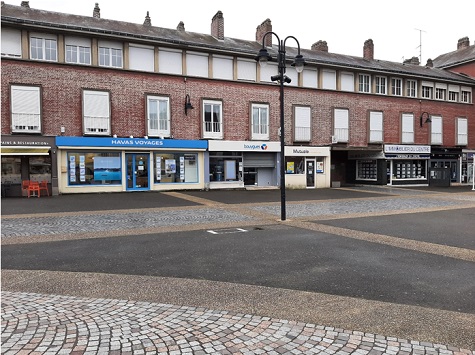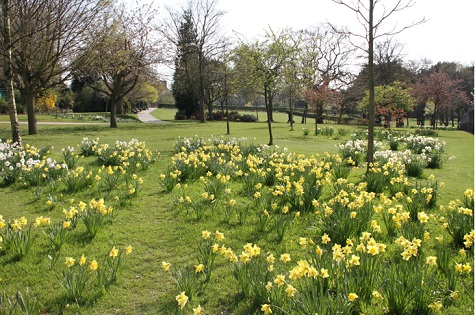I have recently returned from my daughter’s wedding in France, where we had hired a chateau for the week for family members and friends to stay.
An amazing venue with reasonably well-kept gardens, however, I must say as a turf professional, the lawns could have done with a good renovation to introduce some new grasses into the sward and to remove the noticeable established broad leaved weeds.

No doubt during the summer months the lawns probably take a quite a battering with both foot traffic and the hot weather. I did notice some Rainbird pop-up sprinklers in the lawn areas, so hopefully they help keep the grass watered during the hot periods in the summer months.
However, having said that, the French have a different attitude towards their grassed areas in that they tend let them grow more naturally and do not share our British mentality of maintaining striped lawns.

The chateau was situated a couple of miles from the nearest town of Souillac, a half hour drive from Brieve Airport. We drove from our home in Shropshire to Souillac some 800 miles. The contrast between our roads in England and France are quite staggering. The roads in France were far better than ours in the UK - no potholes, no roadworks and more importantly no litter.

Everywhere we drove in France, through villages and towns, there was not one piece of litter to be seen. I was quite taken aback by the standard of care and attention to detail with the way they looked after their roads and verges. From talking to a few locals, while I cannot speak for all French roads, it is generally true that many French roads are kept relatively litter-free. There are several reasons for this:
Strict littering laws: In France, littering is taken very seriously and can result in a fine. This helps to discourage people from throwing rubbish out of their car windows or leaving litter on the side of the road.
Regular cleaning: Many French roads are regularly cleaned by local authorities, which helps to keep them free of litter. Street sweepers and garbage trucks are often seen cleaning up the roads and picking up any litter that may have been left behind.
Public awareness: French society places a strong emphasis on keeping public spaces clean, and this includes roads. There is a general awareness among the public that littering is not acceptable and that everyone has a responsibility to keep the environment clean.
Cultural values: Keeping public spaces clean is seen as a point of pride in French culture. This is reflected in the attention paid to maintaining public spaces, including roads.

Overall, it seems a combination of strict laws, regular cleaning, public awareness, and cultural values help to keep many French roads and public open spaces free of litter.
While staying in Pont de Remy I noticed a team of French workers cleaning the roads by hand and spreading salt to kill any weeds and unwanted vegetation in the pavements and road gullies.
The cleanliness of the towns and villages compared to what I regularly see in the UK, was a real eye-opener for me.
While working as a parks manager, I remember some local authority managers quoting figures of £1.5 million to keep their roads and verges free of litter each year. Multiply that by 400 local authorities in the UK and you are looking at a potential annual bill of £450 million for the cost of clearing litter from road verges.
A staggering cost, incurred simply due to the group of people in the UK who cannot be bothered to dispose of their litter in a responsible way. I personally believe it is about time we toughened up our littering laws in this country and, more importantly, started investing that lost money into our parks and public open spaces.
Budget decline for parks and green spaces
While on the subject of parks and open spaces, I read the latest bulletin published by APSE entitled the State of the Market 2023 for Parks and Greenspaces. This document stated some interesting facts on the way we should be listening to our communities and delivering better services.
APSE’s comment on this year’s survey was that undoubtedly the 2022/23 results were still being affected in some way by the impact of the pandemic.

Parks were called upon to meet public health and well-being needs like never before, and despite the lifting of pandemic restrictions, 60% of survey respondents are still stating that they have experienced increases in visitor numbers. This is to a certain degree worrying, not the success of parks in still attracting visitors, but the fact budgets are not reflecting the need for extra resources, with many expecting continuing budget cuts.
It was noticeable that over 92% of respondents now feel that parks should be given statutory status to prevent further cuts.
However, it would seem from the report that there is a real belief amongst parks professionals that service quality may start to be seriously affected, because of the ongoing pressures on budgets, changes to maintenance frequencies and a need for investment, particularly as visitor numbers are remaining high, and in many cases increasing.
As a Green Flag judge, I am constantly hearing the same dilemmas. Reduced budgets over time will see a reduced level of services within our parks and open spaces.
These reduced budgets are nothing new, in fact most local authorities have been dealing with the constant demise of budgets since the introduction of the Conservative government's 1988 Local Government Act (Compulsory Competitive Tendering Act of 1988). That extended compulsory tendering to a wide range of local authority services mainly supplied in the past by public departments in-house. Ever since this act was introduced, we have seen a constant reduction in parks budgets.
Moreover, the ambitions of the leveling up agenda will not be delivered if there is a remaining disparity in access to quality parks and greenspaces, particularly as this is a known determinant in health inequalities. The growing need to recognise the value of our parks and greenspaces both to public well-being and health but also to our local economies, has become abundantly clear over the pandemic years as whole communities descended upon parks and greenspaces as a place of solace.
Let us hope that in the coming years we will see a change in the government’s attitude to public parks and finally see them as the valuable assets we all know they are and finally make them a statutory service to ensure they are here for the next generation of park users.